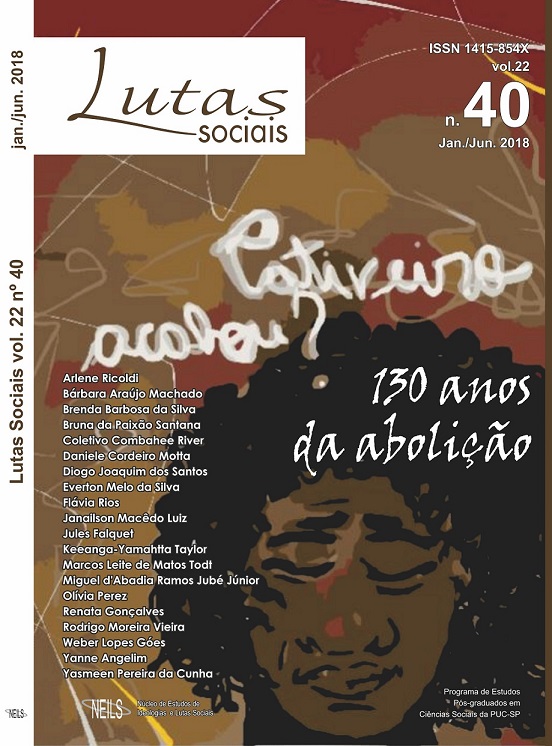History of the Combahee River Collective
DOI:
https://doi.org/10.23925/ls.v22i40.46660Keywords:
Combahee River Collective, black feminism, feminist movement, racism.Abstract
Inscribed within the continuing struggles of black women since the slave era, black feminism emerged publicly in the United States at the end of the 1960s. Unknown for many years, with few translated studies of it, today there is a growing interest in this movement. In fact, its pioneering actions and reflections on the imbrication of social relations (of sex, “race” and class) are particularly stimulating for thinking about racism and sexism (without neglecting class), which is a pressing issue in contemporary struggles.References
BREINES, Winifred. Learning about racism: white socialist feminism and bread and roses. In: The trouble between us: an uneasy history of white and black women in the feminist movement. New York: Oxford University Press, 2006.
CLARKE, Cheryl. The Failure to Transform: Homophobia in the Black Community. In: SMITH, Barbara. (org.). Home girls: a black feminist anthology. New Brunswick, New Jersey & London: Rutgers University Press, p.190-201, 2000.
DAVIS, Angela. Reflections on the black woman’s role in the community of slaves. Black Scholar, vol. 3, n. 4, p. 3-15, 1971.
HARDING, Sandra. Is science multicultural? Postcolonialism, feminism, and epistemologies. Bloomington: Indiana University Press, 1998.
HARRIS, Duchess. All of Who I am in the Same Place: The Combahee River Collective. Womanist Theory and Research, vol. 3, n. 1, 1999.
COLLINS, Patricia Hill. Black sexual politics. African Americans, gender, and the new racism. New York & London: Routledge, 2005.
GUILLAUMIN, Colette. Sexe, race et pratique du pouvoir: l’idée de Nature. Paris: Côté-femmes, 1992.
hooks, bell. Feminist theory: from margin to center. Cambridge: South End Press. Classics Series, vol. 5, 1984.
________. Talking back: thinking feminist, thinking black. Cambridge: South End Press, 1989.
HULL, Gloria T.; BELL SCOTT, Patricia; SMITH, Barbara (orgs.). All the women are white, all the blacks are men, but some of us are brave: black women's studies. New York, Old Westbury: The Feminist Press, 1982.
LORDE, Audre. Sister outsider: essays and speeches. New York: Crossing Press, 1984.
MATHIEU, Nicole-Claude. Identité sexuelle/sexuée/de sexe? Trois modes de conceptualisation du rapport entre sexe et genre. In: MATHIEU, Nicole-Claude. L’anatomie politique. Catégorisations et idéologies du sexe. Paris: Côté-femmes Editions. p. 227-266, 1991.
MILLET, Kate. La politique du mâle. Paris: Stock, 1972.
RUBIN, Gayle. The traffic in women: Notes on the “political economy” of sex. In: REITER, Rayna R. (org). Toward an anthropology of women. New York: Monthly Review Press, 1975.
SMITH, Barbara (org.). Home girls: a black feminist anthology. New York: Kitchen Table/Women of Color Press, 1983.
SPRINGER, Kimberly. Living for the Revolution: black feminist organizations, 1968-1980. Durham & London: Duke University Press, 2005.
Springer, Kimberly (1999). Still Lifting, Still Climbing: Contemporary African American Women's Activism. New York : New York University Press, 1999.
WALKER, Alice. In search of our mother’s garden. Harcourt Brace Jovanovich: Publishers. New York, 1983.
WALLACE, Michèle. Black macho and the myth of the superwoman. London: Verso, 1999.
WITTIG, Monique. La pensée straight. Paris: Balland, 2001.
YUVAL DAVIS, Nira. Gender and nation. Londres: Sage Publications,1997.
Downloads
Published
How to Cite
Issue
Section
License
Matérias assinadas não expressam necessariamente a posição do coletivo da revista e são de exclusiva responsabilidade do(a)s respectivo(a)s autore(a)s.
Ao enviar seus textos, o(a)s autore(a)s cedem seus direitos à Lutas Sociais, que autoriza, com prévia permissão do Comitê Editorial, a reprodução das publicações, desde que conste o crédito de referência.



